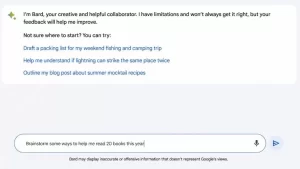
Google has started rolling out its AI chatbot Bard, but it is only available to certain users and they have to be over the age of 18.
Unlike its viral rival ChatGPT, it can access up-to-date information from the internet and has a “Google it” button which accesses search.
It also namechecks its sources for facts, such as Wikipedia.
But Google warned Bard would have “limitations” and said it might share misinformation and display bias.
This is because it “learns” from real-world information, in which those biases currently exist – meaning it is possible for stereotypes and false information to show up in its responses.
How do chatbots work?
AI chatbots are programmed to answer questions online using natural, human-like language.
They can write anything from speeches and marketing copy to computer code and student essays.
When ChatGPT launched in November 2022, it had more than one million users within a week, said OpenAI, the firm behind it.
Microsoft has invested billions of dollars in it, incorporating the product into its search engine Bing last month.
It has also unveiled plans to bring a version of the tech to its office appsincluding Word, Excel and Powerpoint.
Google has been a slower and more cautious runner in the generative AI race with its version, Bard, which launches in the US and UK to begin with. Users will have to register to try it out.
Bard is a descendant of an earlier language model of Google’s called Lamda, which was never fully released to the public. It did, however, attract a lot of attention when one of the engineers who worked on it claimed its answers were so compelling that he believed it was sentient. Google denied the claims and he was fired.
Google senior product director Jack Krawczyk has told the BBC that Bard is “an experiment” and he hopes people will use it as a “launchpad for creativity”.
He showed me an example of how he had used Bard to help him plan his young child’s birthday party.
It came up with a theme which incorporated his child’s love of bunny rabbits and gymnastics, found the address of a venue he mentioned and suggested party games and food.
“So much of the [media] coverage is that AI is the hero,” said Mr Krawczyk. “I think the human is the hero and large language models are here to help unlock creativity.”
While ChatGPT’s knowledge database only extends as far as the year 2021 – it cannot, for example, answer questions about the recent earthquake in Turkey and Syria – Bard can access current information. It explained to me a news story about TikTok being banned on UK government phones.
Read more:
Google’s rival to ChatGPT launches for over-18s





